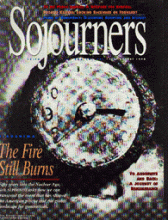Twenty years ago, for the first time in its history, America lost a war, beating a hasty and inglorious exodus from Vietnam as Saigon fell with a thud-a scene not unlike Goliath being brained by one of David's five smooth stones. Playing the Who-To-Blame Game has occupied many people-Right, Left, and center-ever since.
Now one of the most blamed persons, Robert McNamara, has ended his long silence about the harrowing events linked with his name. The result is a good deal more than the usual self-serving account or an insider's report of what actually happened at the White House and the Pentagon in the fateful years of 1961-68. McNamara has said something one never hears from those in charge: "We were wrong, terribly wrong." His anguish with what he did and failed to do was all too obvious when, being interviewed about his book by Diane Sawyer of ABC News, he began to weep.
More than a private confession, McNamara's book is a study of how those who aspire to power can become so caught up in the defense of power that vast numbers of people can be maimed and murdered without it occurring to them that they are committing mortal sins.
For McNamara, who previously had been in charge of the Ford Motor Co. and who knew more about grades of steel than about Vietnam, it all began with Dwight Eisenhower cautioning John Kennedy and his chief nominees for cabinet posts (McNamara was one of them) that if Laos was lost to the Communists, all of Southeast Asia would follow. Here was a first reading of the "Domino Theory," an idea that would cause more bombs to fall on Vietnam than rained down on all of Europe during World War II.
During Kennedy's first year in the White House, American military advisers-a mere 400 at the start-were sent to South Vietnam to help prop up that particular domino. A year later there were 11,000. By the time the war was over, there were 58,000 names that later would be carved on the Vietnam War Memorial.
Read the Full Article
